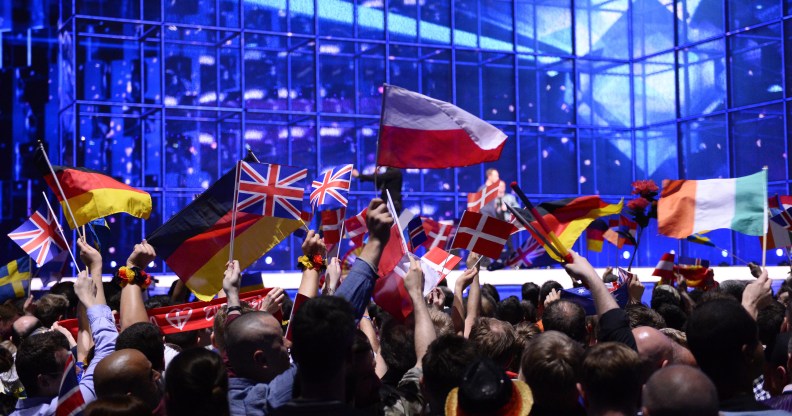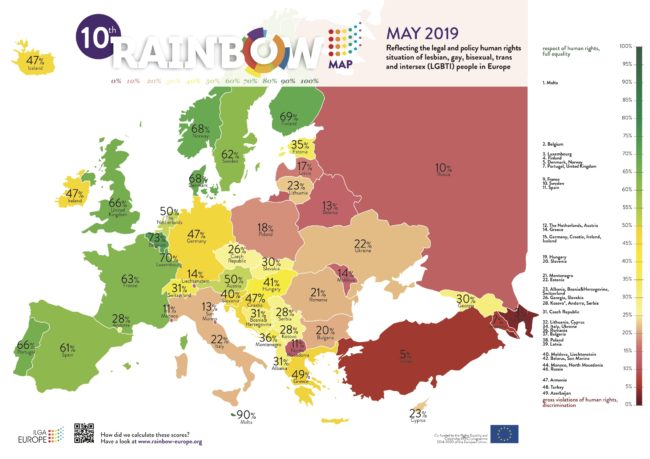LGBT rights in Europe are regressing, campaigners warn

Supporters wave flags ahead of the Eurovision Song Contest 2014 Grand Final in Copenhagen, Denmark, on May 10, 2014. (Jonathan Nackstrand/AFP/Getty)
LGBT rights in Europe are stagnating and, in some countries, regressing for the first time in a decade.
The European chapter of the advocacy group International Lesbian, Gay, Bisexual, Trans and Intersex Association (ILGA-Europe) denounced the troubling state of the LGBT+ rights in the continent after releasing the 10th Rainbow Europe Map and Index on Monday (May 13).
The 2019 Rainbow Europe Map and Index—a monitoring tool designed to rank 49 countries in Europe on criteria such as their LGBT+ equality and non-discrimination laws, legal gender recognition and bodily integrity, protection from hatred and violence, family rights, and spaces in civil society—revealed that some countries are regressing as existing laws and policies disappeared.

2019 Rainbow Europe Map and Index maps LGBT rights in Europe. (ILGA-Europe)
In particular, ILGA-Europe noted that Poland “no longer provides access to medically-assisted reproduction for single women,” while Bulgaria “removed all their administrative and legal procedures for changing name or gender marker in the official documents for trans people.”
Along with Bulgaria, Hungary and Turkey are also countries regressing on the ranking. ILGA-Europe noted their “governments’ failure to uphold fundamental civil and political rights such as freedom of assembly, freedom of association and protection of human rights defenders over the past year.”
In the Balkan region, Serbia and Kosovo have seen their ranking backslide as they did not renew their equality action plans.
Best and worst countries for LGBT+ rights in Europe
Overall, the island of Malta scored the highest, topping the Rainbow Europe country ranking for the fourth year in a row, followed by Belgium—for the second year in the second spot.
Third came Luxembourg, increasing its ranking by 17 spots year-on-year thanks to a “well-modified legal gender recognition law based on self-determination and a comprehensive national action plan.”
The UK, which topped the ranking for four years until Malta took the spot, comes in eighth place, continuing its year-on-year decline and dropping four spots from 2018.
Ranking at the bottom of the 49 countries are Armenia, Turkey and Azerbaijan.
“If ever there was a time to put high political priority on LGBTI equality, it is now! Last year, we warned about the dangers of thinking that the work was done. Sadly, this year, we see concrete evidence of roll-back at political and legislative levels in a growing number of countries. There is no more time to waste,” said ILGA-Europe’s Executive Director, Evelyne Paradis.
“In the current increasingly polarised social and political climate, laws and policies are often the last lines of defence for LGBTI communities. That’s why we need national and European decision-makers to redouble efforts to secure equality in law and in practice for LGBTI people”, she added.
“The countries that are expanding their legislative horizons to embrace this vision of equality for LGBTI people are the ones moving ahead.”
— Micah Grzywnowicz, co-chair of ILGA-Europe’s Executive Board
Micah Grzywnowicz, co-chair of ILGA-Europe’s Executive Board noted that the ranking is now taking into account a wider range of criteria than simply marriage equality: “What is also crucial for our communities are effective laws to recognise rights of trans people to self-determination, robust protection against LGBTI-phobic violence and speech, equal access to reproductive rights, and prohibiting medical intervention on intersex children.
“Our revised index makes this fact clearer now. The countries that are expanding their legislative horizons to embrace this vision of equality for LGBTI people are the ones moving ahead. We are heartened to continue to see examples of governments demonstrating leadership in this direction, as Luxembourg and Finland did over the past year.”

